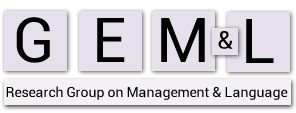Linguistic authority in the context of European mobility: addressing the empty promise of élite multilingualism
Veronika Lovrits
ABSTRACT
This qualitative study examines linguistic authority in an international
department of a European Union institution in Luxembourg. Using
socio-pragmatic discourse analysis, it investigates language workers’
stances towards language use at work. The findings reveal manipulative
effects of language ideologies – (élite) multilingualism and native
speakerism – that promote a business-like understanding of the value
of language(s) in a public institution. While the institution benefits from
this setup, its negative effects seem more pronounced for (“routed”)
workers in unstable situations of international mobility compared to
those who are settled (“rooted”). The paper advocates for increased
critical language awareness and seeks to sensitise stakeholders to the
effects of language ideologies in professional settings. This discussion is
particularly relevant for public institutions that promote multilingualism
while using English as the common language of communication.
However, it may also inspire other multilingual organisations in which
management aims to enhance their employees’ work experience.
